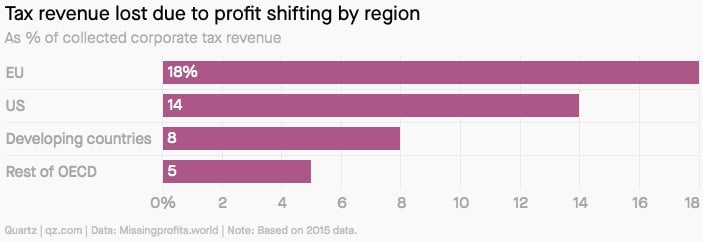Global tax deal, Nigeria bans Twitter, invisible sculpture
Good morning, Quartz readers!


Good morning, Quartz readers!
Was this newsletter forwarded to you? Sign up here. Do you know someone who’s looking for inspiration for a baby name? Forward it to them!
Here’s what you need to know
Is there an Amazon-sized loophole in the G7 tax deal? US treasury secretary Janet Yellen says an accord to recover more taxes from giant corporations across different markets will cover Amazon and Facebook. But some tax experts say pegging parts of the deal to profit margins may let Amazon off the hook. Read more below.
Nigeria banned Twitter… It announced on Friday—on Twitter—it would suspend the platform for “undermining” the country, two days after the platform removed a tweet from president Muhammadu Buhari.
…Donald Trump can return to Facebook in time for the next US election… The former president was barred in January for inciting the Capitol riot.
…and Microsoft suppressed “Tank Man” globally. It said the temporary removal of the iconic image from Bing searches outside China on the anniversary of the 1989 Tiananmen Square crackdown was due to “human error.”
A trio of private equity firms is buying US medical supplier Medline. At more than $30 billion, this could be the healthcare industry’s biggest leveraged buyout in history.
Meghan and Harry had a baby girl. Lilibet “Lili” Diana Mountbatten-Windsor is named for Queen Elizabeth and the late Princess Diana.
Sri Lanka recovered the black box from a cargo ship sinking off its coast. The ship, which caught on fire last month, could create a major environmental disaster by leaking chemicals and oil into the sea.
What to watch for
Colonial Pipeline CEO Joseph Blount will testify to the US Congress on June 9 about the ransomware attack last month that forced his company to shut down its fuel supply for six days and fork over $4.4 million to hackers. The goal of the hearing, held by the House Committee on Homeland Security, is to extrapolate lessons from the attack on how to improve cybersecurity for critical infrastructure.
An underlying question of the hearing is what the role of the government ought to be when cyberattacks happen. Most countries, including the US, say businesses shouldn’t pay ransom to hackers. But given that it can be incredibly expensive and time-consuming to rebuild IT infrastructure, putting a company at risk of going out of business, many companies may see ransom as the lesser of two evils.
One option could be for the government to outlaw ransomware payments—a move likely to be unpopular among business leaders. Others say the government should focus on a deeper issue: Getting countries like Russia, China, North Korea, and Brazil to stop protecting for-profit hacker groups.
Charting the global corporate tax
G7 leaders hailed the global corporate tax agreement they hammered over the weekend as “unprecedented” and “historic.” The proposal, which is up for discussion at the G20 meeting in July, calls for a global corporate tax rate floor of 15% and extra taxes on the world’s most profitable companies.
The new rules should counteract some of the effects of what policymakers call “the race to the bottom” in corporate tax rates across the world. The EU and the US have borne the brunt of that trend as multinationals shift their profits to tax havens.

But the deal is not sitting well with advocates for poor countries, who say the tax rate floor needs to be higher to fairly spread the benefits of the proposed changes. Under one analysis, by the Tax Justice Network, non-G7 countries would recover more than three times as much in lost tax revenue if the rate were 25% instead of 15%. “This cannot stand,” Alex Cobham, the Tax Justice Network’s chief executive, said in a statement.
So if discussions were contentious among the G7, expect considerably more drama when the proposal moves to the G20.
Social media’s new wave
After years of Facebook dominance, why are independent social media platforms gaining momentum? There are a few possible factors that help explain the new faces in the field:
- Regulators spooked Facebook by stepping up antitrust enforcement. Wary of attracting negative attention, the social media giant has eased up on its usual practice of buying up potential competitors, giving them time to develop on their own.
- Users have embraced new content formats and no one platform can do everything well. Apps like TikTok and Clubhouse filled unserved niches (short video and live audio, respectively) that the major platforms left vacant.
- Incumbents lost users’ trust. Facebook and Twitter have borne the brunt of the blame since 2016 for amplifying misinformation, snooping on user data, and applying inconsistent moderation standards, leaving people more willing to try out a new option.
- The pandemic left people feeling bored, lonely, and eager to find new ways to connect via social media.
Whatever the reason, we’re about to find out which theory is right. The challengers could continue to grow, carving out their own niches or even stealing market share for Facebook. Or the giants could win again.
✦ Want a new way to connect without adding another social-media site into your life? Try out a Quartz membership for free and join our global community.
Handpicked Quartz
🏀 Members of Congress are pressing the NBA to get tough on Xinjiang cotton
Surprising discoveries
An “invisible sculpture” sold for $18,300. The artwork’s Italian creator stipulated that it be displayed in a five-by-five-foot space.
A new Tokyo cafe aims to alleviate loneliness with robots. The robot avatars will be controlled by people with disabilities that prevent them from leaving their homes.
WeChat users are banned from picking their noses on livestreams. The Chinese social-media platform also banned spanking and wearing underwear on one’s head.
Arctic ice is melting twice as fast as scientists thought. This will exacerbate global warming—and also ease cargo shipping between China and Europe.
Puppies are genetically predisposed to communicate with us. Even young pups who haven’t spent time with humans can figure out how to follow a pointing finger.
Our best wishes for a productive day. Please send any news, comments, friendly robots, and obedient puppies to [email protected]. Get the most out of Quartz by downloading our iOS app and becoming a member. Today’s Daily Brief was brought to you by Sumnima Lama, Tripti Lahiri, Ana Campoy and Sarah Todd.